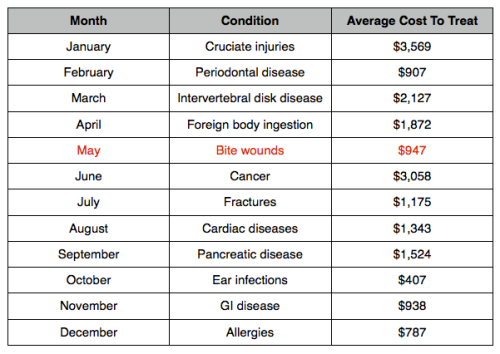Last month I started a series of post about Petplan's statistics of the most common claims submitted by policyholders by month. I decided to comment about each month's claim from my perspective as a veterinarian.
Source: Press Release
Bite wounds in both dogs and cats frequently become infected and require treatment by a veterinarian. In fact, it is best to have your pet examined as soon as you realize there are bite wounds present to try and prevent an infection that will require more extensive and expensive treatment.
Injuries sustained when a dog fights with another dog or a wild animal can be severe and even life-threatening. The severity of the wounds and tissue damage isn’t always apparent at the initial examination and complications can develop later leading to prolonged and expensive treatment.
Some pet insurance companies may deny a claim submitted for fight wounds for various reasons that can be found in their policies. Some companies won’t pay for multiple dog fight claims when the dogs involved are housemates. The reasoning is if this has happened before, then you know that you have two dogs that just don’t get along sometimes and you should take the necessary steps to prevent recurrent episodes. Since aggression can potentially be linked to hormonal influences, some companies won’t pay for wounds associated with a fight with any other pet (not just housemates) if your pet (dog or cat) has not been neutered or spayed. Be sure to check your policy to see how these type injuries are covered. If you still have questions, contact your company and ask a representative for an explanation.
Completely preventing recurrence of fighting episodes between housemates can sometimes be difficult. There can be medical causes for aggression exhibited by a pet and your veterinarian should be able to rule these out by doing some tests. There are also a number of potential behavior diagnoses that need to be considered. Successful treatment of aggression and fighting among pets depends on an accurate diagnosis and assessment of the underlying cause and may require the assistance of a veterinarian specializing in behavior disorders.
Most cat fights that result in injury occur when cats are outdoors among other cats. Most of these are puncture type wounds that can easily cause an abscess that may require drainage and antibiotics. Therefore, keeping your cat indoors will go a long way toward preventing these types of injuries. Some feline diseases can be transmitted by biting e.g. a feline immunodeficiency virus (feline AIDS) and feline leukemia. It is always wise to have your cat tested for these viruses 2 - 3 months after being in a fight. Consult with your veterinarian.
What has been your experiences when dealing with bite wounds in your pets?

